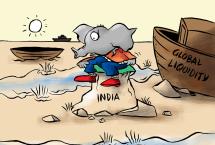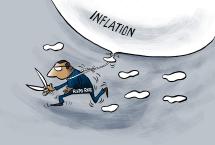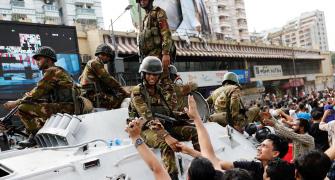India's gain will be an additional business of $300 million to $400 million per month if 10-11% of Bangladesh's export is diverted to Indian hubs like Tiruppur.

IMAGE: People celebrate Bangladesh Prime Minister Sheikh Hasina's resignation in Dhaka, August 5, 2024. Photograph: Mohammad Ponir Hossain/Reuters
With the crisis in Bangladesh intensifying, the textile sector, which contributes a lion's share of its exports, is likely to be a victim of the turmoil, with international buyers shifting their focus to alternative markets like India.
India's gain will be an additional business of $300 million to $400 million per month if 10-11 per cent of the neighbouring country's export is diverted to Indian hubs like Tiruppur, say industry experts.
"We expect orders may start coming to Tiruppur, and this financial year, they are expected to be at least 10 per cent more than last year's," said K M Subramanian, president of the Tiruppur Exporters' Association.
Bangladesh's monthly apparel export is $3.5 billion to $3.8 billion and has a high double-digit share in the European Union and the United Kingdom and a 10 per cent market share in the United States.
India is exporting in the range $1.3 billion to $1.5 billion per month.
"This is unfortunate and if the current disruption lasts long, it will affect buyer sentiment. Initially, buyers will likely shift some orders to India and other countries. We have the capacity to handle an additional $300 million to $400 million in orders immediately," said Prabhu Damodaran, secretary to the Indian Texpreneurs Federation, an industry body.

The crisis has come at a time when Bangladesh was expected to cross $50 billion in annual exports in 2024, compared to around $47 billion in 2023.
In addition to this, manufacturing units owned by Indians in Bangladesh are also likely to shift their base to India.
According to trade-policy analyst S Chandrasekaran, around 25 per cent of the units in Bangladesh are owned by Indians.
They include companies like Shahi Exports, House of Pearl Fashions, Jay Jay Mills, TCNS, Gokaldas Images, and Ambattur Clothing.
"The movement of consignments is stuck, and there is a breakdown in the supply chain for the upcoming Christmas season. India has an advantage here because orders will be diverted," Chandrasekaran added. "The sudden drop in global volumes may be compensated by a rise in Indian exports."
India-Bangladesh trade headed for uncertainty:
Shreya Nandi
New Delhi's trade and investment relationship with Dhaka may have entered a phase of uncertainty after Bangladesh Prime Minister Sheikh Hasina resigned following weeks of violent demonstrations and their army chief declared that an interim government will now run the country.
Bangladesh is India's 25th largest trading partner, with the size of the bilateral trade at $12.9 billion.
The trade is dominated by exports, with Bangladesh being India's eighth largest export partner. In FY24, India's exports to Bangladesh contracted 9.5 per cent to $11 billion.
Over the last two years, outbound shipments to Dhaka have been declining.
For instance, during FY22, Bangladesh was India's fourth largest export market.
However, outbound shipments were affected by factors such as dollar shortage, high inflation and other factors like India's export restrictions on essential items such as wheat and some categories of rice.
Bangladesh is also a key destination for Indian auto exports, alongside African and Latin American countries.
The political unrest in the neighbouring country could also pose risk for investors for their existing projects and may lead to an influx of illegal migrants into India.
"The political unrest in Bangladesh will create uncertainty for exporters. In fact, there will be greater risk for investors," said Arpita Mukherjee, professor, Indian Council for Research on International Economic Relations.
According to Delhi-based think tank Global Trade Research Initiative (GTRI), India's exports, such as onions, other agricultural products, and electricity, are crucial for the people and economy of Bangladesh and may not be significantly affected by the unrest.

'However, Bangladesh's economic challenges have negatively impacted bilateral trade in recent years... Bangladesh has been facing a severe dollar shortage, which has limited its ability to import goods, including those from India. The rising inflation in the country has also reduced domestic demand, leading to lower consumption of both local and imported products,' GTRI said.
India's imports from Bangladesh contracted 8.7 per cent to $1.8 billion in 2023-24. Top inbound shipments include iron and steel products, textiles and leather goods, among others.
Biswajit Dhar, distinguished professor at the Council for Social Development, said that Bangladesh is very important and a large market for India.
"Political uncertainty in Bangladesh will certainly hit us on the trade front. If the political uncertainty spills over to economic uncertainty," Dhar added, "then Bangladesh's economy will get affected. That may result in illegal migration into India."
Feature Presentation: Aslam Hunani/Rediff.com



















